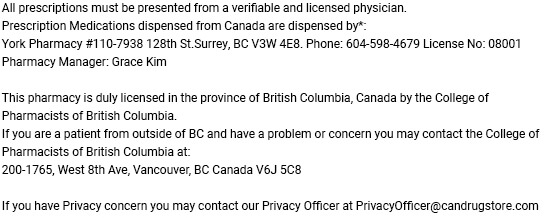Description
Indications
Diclofenac is classified as a nonsteroidal anti-inflammatory drug (NSAID) and is indicated for the treatment of mild-to-moderate pain. It is used to alleviate the symptoms of arthritis (e.g., osteoarthritis or rheumatoid arthritis), including inflammation, swelling, stiffness, and joint pain.
This medication is also prescribed for ankylosing spondylitis, a type of arthritis that affects the spine’s joints, as well as for other painful conditions such as menstrual cramps. Diclofenac can also be used to treat acute migraine attacks, with or without aura, in adults. It does not prevent or reduce the frequency of migraine attacks.
Uses and Dosage
Diclofenac is available in various forms: tablets, liquid-filled capsules, hard gelatin capsules, extended-release tablets, delayed-release tablets, and packets of powder for solution to be taken orally.
Diclofenac liquid-filled capsules are typically taken four times daily, while diclofenac hard gelatin capsules are usually taken three times daily on an empty stomach. Diclofenac extended-release tablets are taken once daily, occasionally twice daily if necessary for pain control. Diclofenac tablets and delayed-release tablets are usually taken two, three, or four times a day.
Diclofenac solution is consumed without food as a one-time treatment to alleviate migraine headache pain.
If you’re instructed to take diclofenac regularly, do so at the same time(s) each day.
Take diclofenac precisely as directed, without altering the dosage or frequency unless advised by your doctor.
Different diclofenac products release the medication differently in the body and are not interchangeable. Only use the diclofenac product prescribed by your doctor, and refrain from switching to a different product unless instructed to do so.
Your doctor may modify your medication dosage during treatment based on your response. Keep your doctor informed about your experiences with diclofenac during treatment.
If you’re taking the powder for solution, mix it with water before consumption. Remove one packet from a row of three attached packets. Pour 2 to 4 tablespoons (1 to 2 ounces; 30 to 60 mL) of water into a cup, add the packet contents, mix thoroughly, and consume the entire mixture immediately. Dispose of the empty packet in a secure trash can, out of reach of children and pets.
Side Effects
Some side effects may occur that usually do not need medical attention:
- diarrhea
- constipation
- gas or bloating
- headache
- dizziness
- ringing in the ears
Inform your healthcare provider immediately if you experience any serious side effects:
- unexplained weight gain
- shortness of breath or difficulty breathing
- swelling of the abdomen, feet, ankles, or lower legs
- excessive tiredness
- lack of energy
- nausea
- loss of appetite
- itching
- pain in the upper right part of the stomach
- yellowing of the skin or eyes
- flu-like symptoms
- fever
- blisters
- rash
- hives
- swelling of the eyes, face, tongue, lips, throat, arms, or hands
- difficulty breathing or swallowing
- hoarseness
- pale skin
- fast heartbeat
- cloudy, discolored, or bloody urine
- back pain
- difficult or painful urination
Caution
- Prior to taking diclofenac, disclose any allergies to this medication, aspirin, other NSAIDs (such as ibuprofen, naproxen, and celecoxib), or any other allergies to your healthcare provider or pharmacist. Inactive ingredients in this medication may cause allergic reactions or other complications.
- Prior to using this medication, you should provide your medical history to your healthcare provider or pharmacist. Disclose any previous history of asthma, including worsening of breathing after taking aspirin or other NSAIDs, blood disorders such as anemia and bleeding/clotting problems, growths in the nose such as nasal polyps, heart disease such as a previous heart attack, high blood pressure, liver disease, stroke, swelling (edema, fluid retention), and stomach/intestinal/esophageal issues such as bleeding, heartburn, and ulcers.
- The use of NSAID medications such as diclofenac may result in kidney problems. Dehydration, heart failure, kidney disease, age, and certain medications may increase the likelihood of such problems. Ensure you consume sufficient fluids as recommended by your doctor to prevent dehydration and contact your doctor immediately if you experience unusual changes in urine color or volume.
- This medication may cause drowsiness, dizziness, or blurred vision. Alcohol or cannabis may exacerbate these symptoms. Refrain from driving, operating machinery, or engaging in activities requiring clear vision or alertness until you can do so safely.
- This medication may increase the risk of stomach bleeding. Daily use of alcohol and tobacco may further elevate this risk.
- This medication may make you more sensitive to the sun, increasing the risk of sunburn or skin blisters/redness. To reduce the risk of such complications, limit sun exposure, avoid tanning beds and sunlamps, wear protective clothing and use sunscreen.
- Elderly individuals may be at higher risk of stomach/intestinal bleeding, kidney problems, heart attack, and stroke while using this drug.
- If you are of childbearing age, discuss the risks and benefits of this medication with your healthcare provider. Inform your doctor if you are pregnant or planning to become pregnant. This medication may harm an unborn baby and cause problems during normal labor/delivery. Its use is not recommended from 20 weeks of pregnancy until delivery. If necessary, the lowest effective dose should be used for the shortest duration of time.
- This medication passes into breast milk. Consult your doctor before breast-feeding.
Form and Strength
Voltaren SR is available in the following forms and strengths:
- Voltaren SR extended-release tablet:
- 75 mg
- 100 mg
- diclofenac SR capsule:
- 75 mg
- 100 mg
FAQ
Is Voltaren a strong painkiller?
Voltaren is more potent than NSAIDs like ibuprofen and non-opioid painkillers like Tylenol. It is less potent than opioid medications like codeine and morphine.
How quickly does Voltaren work?
Voltaren takes 20 to 30 minutes to work if you take it as tablets or capsules.
Resources
- https://www.medicalnewstoday.com/articles/voltaren-otc#summary
- https://www.nhs.uk/medicines/diclofenac/#:~:text=When%20will%20I%20feel%20better,it%20as%20tablets%20or%20capsules
- https://medlineplus.gov/druginfo/meds/a611002.html
- https://www.rxlist.com/voltaren-drug.htm
- https://www.webmd.com/drugs/2/drug-54/voltaren-oral/details
- https://www.mayoclinic.org/drugs-supplements/diclofenac-oral-route/side-effects/drg-20069748
- https://www.drugs.com/voltaren.html


 Prescription Required
Prescription Required  Formulation :
Formulation : 




